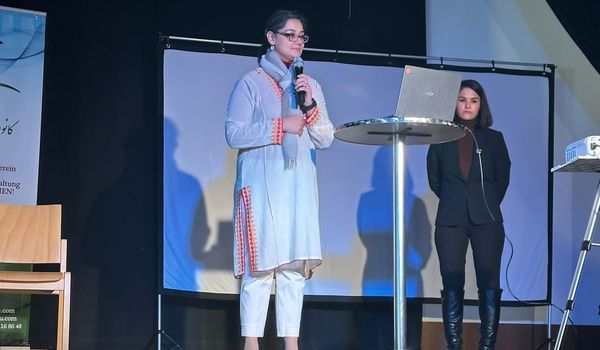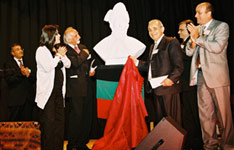Report as of March 11, 2023






Women’s rights are the main topic of debate between the Taliban, the Afghan diaspora and the rest of the world. The rights of 50% of the country’s citizens appear to depend on the fate of the Taliban government and how the international community intends to deal with the de facto government that has seized power by force. Since taking power, they have implemented some of the toughest laws in the world. And most of these harsh laws have a disproportionate impact on women. The Taliban have almost completely excluded Afghan women from public life since taking power on August 15, 2021.
To discuss the repression of Afghan women by the Taliban and the challenges faced by Afghan diaspora women in their host countries, the Afghan Cultural Association AKIS organized a conference on March 11, 2023 entitled “Fighting for the Rights of Afghans Women” in cooperation with the Vienna Institute for International Dialogue and Cooperation (VIDC) and the Danish Refugee Council (DRC). The aim of AKIS was to network, form new alliances and make people in Europe aware of the plight of Afghan women. The event in Vienna was attended by 150 participants from Austria, the United States, Germany, Norway, Sweden, Turkey, the Netherlands and Switzerland.
Taliban decrees against women
The Taliban’s most recent decree of December 2022 bans women and girls from attending universities and working in local and international non-governmental organizations (NGOs). Many people, especially in the Afghan diaspora, were shocked by this decree. Heela Najibullah, a peace and reconciliation researcher speaking at the Vienna Women’s Conference, claimed that in 2021, 11 of the Taliban’s 25 decrees were directed against women. Of the 53 edicts issued in 2022, 42 targeted women, who were banned from working for NGOs and from attending universities.
Girls have been banned from sixth grade since the Taliban returned after the chaotic withdrawal of American forces in August 2021. Every day the opportunities for women and girls are becoming more limited. Feeling that their options are limited, many girls have turned to religious education. According to Reuters, the number of girls attending religious schools has doubled in Kabul and South Kandahar provinces. Najibullah is concerned about young Afghan girls being exposed to an „extremist radical ideology“ rather than the study of Islam as a religion. She assured that religious schools are being set up all over the country, from the central provinces of Daikundi to Paktia in the southeast.
Najibullah stressed that Afghanistan has lost its internationally recognized government and territorial integrity to the Taliban because of the presence of extremist groups in their homeland. Afghanistan has also become the scene of rivalry between great powers such as China, Russia and the United States. She also warned against the imposition of a radical, extremist ideology in Afghanistan. „The Taliban are an extremist ideological group whose members are still on the United Nations terror sanctions list.“
“We fight for equality and freedom”
In January 2022, the Taliban arbitrarily detained a women’s rights advocate, Tamana Zaryab Paryani, and her sisters after they took part in „Naan, Kaar, Azaadi – Bread, Work, Freedom“ protests to demand their rights and freedom . After nearly a month in Taliban prison, Paryani and her sisters were released and fled to Pakistan before being evacuated to Germany.
As the keynote speaker at the Vienna conference, Paryani vowed that she will continue to speak out in Germany for Afghan girls and women oppressed by the Taliban regime. She will campaign for equality and freedom for women until this is achieved. After her imprisonment by the Taliban, she had two options: remain silent in Afghanistan, or leave the country and speak out on behalf of other Afghan women who are suffering under the Taliban’s ruthless rule. She decided to leave.
„Our struggle is not about bread and work, but about equality and freedom,“ Paryani said in her speech at the conference. She appealed to the international community to take action against the Taliban’s sexist ideology. Merely condemning the Taliban would not stop the misogynistic Taliban from kidnapping, torturing and raping women.

The impact of displacement on the mental health of Afghan women refugees
The situation of Afghan women and the effects of displacement on their mental health in Austria were the subject of Judith Kohlenberger’s academic presentation at the conference. Kohlenberger, a professor at the Institute for Social Policy at the Vienna University of Economics and Business, found that the recognition rate of female Afghan refugees is higher than that of male Afghan refugees in Austria. In December 2022 and early 2023, respectively, Sweden and Denmark announced that they would automatically grant asylum to all Afghan women and girls “on the basis of their sex alone”. With this decision, they reacted to the increasing restrictions on women’s rights and the growing unpredictability for Afghans seeking asylum in Europe and other countries.
According to Kohlenberger’s research, it is also interesting to shed light on the family structure of the women who fled from Afghanistan. Women from Afghanistan who are fleeing are more likely to be married and live in Austria with their families and children.
Since their arrival in Europe, Afghan immigrants have faced numerous difficulties in integrating into the host societies. Women need more time than men to fully integrate. They cannot register for language courses or enter the labor market as they usually have 1-3 children. According to Kohlenberger, women in the EU are not well integrated into the labor market. In contrast to 62% of male refugees, female refugees make up 45% of the working population. Since women are often employed part-time, in precarious jobs or as domestic help and are exposed to a variety of constraints and prejudices, all these factors ultimately have an impact on their mental health health off. According to her research, female Afghan refugees have a greater psychological burden than Syrian or Iraqi refugees. The conclusions of her research suggest that Afghan women are psychologically more affected than Afghan men.
mobilization of solidarity
At the Vienna conference, several speakers stated that the Afghan crisis is complex and that the international community bears the blame for its aggravation. The Taliban have not only declared war on women, but on the entire Afghan population. Undoubtedly, this war is being waged primarily by Afghan women. According to Shafiqa Razmenda, a human rights activist from Germany who attended the conference, there is no peace among the Taliban, although the Taliban claim they brought peace to the country. She claimed that social harmony has disappeared and that the Taliban have deepened social divisions and fostered distrust among Afghans.
In the opening speeches of the conference, the SPÖ member of parliament representing the district administration Marina Hanke, Asye Sel from the Vienna Chamber of Labor and VIDC director Sybille Straubinger expressed their solidarity with Afghan women. For Marina Hanke, the events in Afghanistan are a serious violation of women’s and human rights. She argued that Austria should express its support for Afghan women. Asiye Sel also called for support for Afghan women. In her opinion, „the problem of Afghan women is not only an Afghan problem, but an international problem“. Sybille Straubinger emphasized that VIDC has been supporting the Afghan diaspora in Austria for many years. For the VIDC, the diaspora is the best resource to support democracy, women’s rights and human rights in Afghanistan because it has access to civil society in the country. By working with the diaspora, the VIDC wants to give the Afghan community in the diaspora a perspective.
The way to the future
„If there is to be meaningful change for freedom, not just bread and work, Afghan women in Afghanistan and in the diaspora must unite,“ Paryani said. She accused Western countries of collaborating with a „terrorist group“ occupying their homeland. She called on the international community to add the Taliban to the travel ban list. Several participants, including Paryani, believe that the Taliban should be overthrown instead of reforming their policies to give girls access to secondary schools and universities. „We must demand the elimination of the Taliban from our homeland,“ Paryani concluded.
According to Heela Najibullah, for Afghanistan to get out of its current predicament, “the people must be involved in the decision-making process, especially the women of Afghanistan.” For a legitimate government to take power and for Afghanistan to be neutral, a process must be set in motion “ where the people are the focus,” said Najibullah.
Fazull Mahmood Rahemee Pajwak, representative of the Afghan Embassy in Vienna, said at the conference: „If Afghanistan ever gains its freedom, there is no doubt that women will have played an important role in its liberation.“ Shafiqa Razmenda made a similar statement. „I believe that women in Afghanistan will emerge victorious,“ Razmenda said.
Read more in VIDC site:
https://www.vidc.org/regionen/naher-und-mittlerer-osten/kampf-um-die-rechte-der-afghanischen-frauen




how to get viagra usa